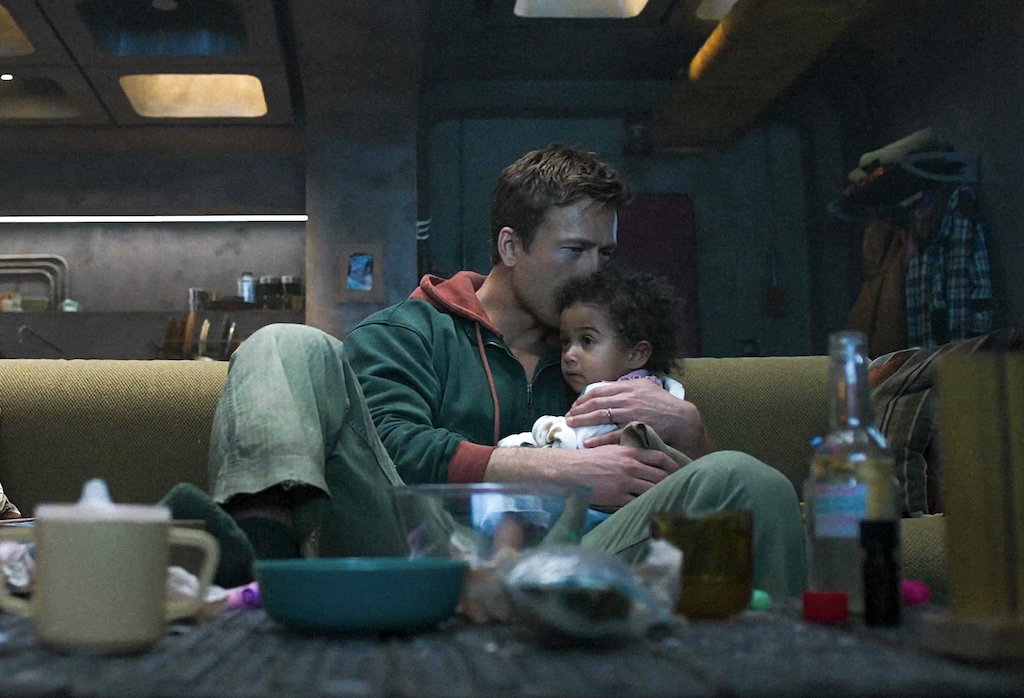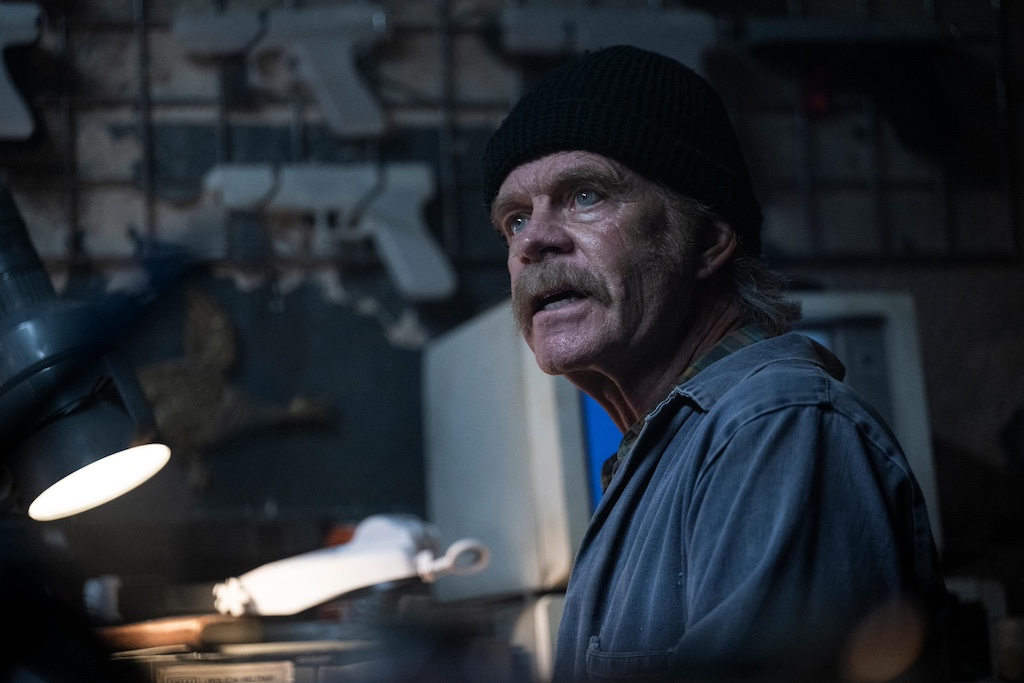The Running Man Trips Across the Starting Line
Edgar Wright’s dystopian satire, The Running Man, tries to play it safe and ends up pleasing no one.

Still from The Running Man. (Paramount Pictures)
Everything is wrong with Edgar Wright’s The Running Man, and I say that as someone who’s long been rooting for him. I’m a big fan of his early films Shaun of the Dead (2004) and Hot Fuzz (2007). I liked his 2021 rock-documentary The Sparks Brothers, and I even appreciated parts of Baby Driver (2017) and Last Night in Soho (2021).
But his latest is such a misfire that’s downright weird.
The Running Man isn’t quite a remake of the cheesy old 1987 Arnold Schwarzenegger vehicle mainly because Wright wanted to do a more faithful take on the original source material: Stephen King’s very prescient 1982 novel. It’s about a dystopian future America run by a corporate media network, and it was written by King to depict the distant year of 2025. In other words, it should’ve been a cinch to make an action movie that appeals to the immiserated American masses in our very real dystopian 2025, instead of the expensive box-office dud this is.
Maybe that’s because Wright doesn’t seem invested at all in connecting the dots. He keeps depicting in broad strokes the dire authoritarian turn America has taken and hinting at a resistance movement operating underground among the vast immiserated underclass, but it’s all kept bland and politically vague. Vague enough for King to declare proudly that he loves this adaptation because it’s “a bipartisan thrill ride.”
Where’s Robocop director Paul Verhoeven when you need him? His version of The Running Man might’ve set audiences’ hair on fire in the best possible way.

Wright’s movie centers on one titanic network that rules the nation while the vast majority of desperately poor people alleviate their sufferings by watching the network’s most popular game show, The Running Man. The show is structured to feature three of their own — their fellow poors — as contestants in a “Most Dangerous Game” scenario, trying to survive for thirty days on the run out in the hostile world where every citizen is on the watch, looking to turn them in for cash rewards. “Hunters” hired by “the execs” who run the nation track the contestants down with high-tech surveillance gadgets and the latest in lethal weaponry.
The winner gets an insane one billion dollars in prize money. But the thing is, there are never any winners — the game is rigged, and nobody ever survives for thirty days.
Glen Powell plays the protagonist Ben Richards, a hard-up unemployed construction worker who’s been blackballed from employment because he once made a suspiciously decent gesture on behalf of his fellow workers that almost smacked of a unionizing mindset. Meanwhile, his wife Sheila (Jayme Lawson) is working extra shifts as a waitress at a sleazy club catering to elite men, and his young daughter is seriously ill with a high fever. They’re giving the toddler useless over-the-counter drugs, but she needs real — and expensive — medical attention. So, desperate for fast money, Ben goes to network headquarters to audition for one of their game shows, having promised his wife he’ll take anything except the always-deadly Running Man.
But his pissed-off demeanor and his employment record of insubordination is so consistent, he’s immediately flagged as the perfect Running Man contestant. He’s sure to bring loads of entertainment to the brainwashed masses who can’t help longing for a defiant representative, though most of them will be equally entertained to see him brutally killed.
Okay, that all hits pretty close to home, so what’s the problem?
Even by the often absurdly unrealistic standards of Hollywood filmmaking, the early scenes are so phony it’s painful. It’s as if no one involved in the production had ever been unemployed or struggling to get by or living in a crappy low-rent apartment. Though from what I’ve read about high levels of unemployment in the American film industry, with crew workers searching in vain for their next jobs, exhausting their savings, and losing their houses, I know that can’t possibly be the case.
Powell has never been worse than in this film, trying to play a very straightforward and accessible part, the protagonist of most action films, the angry working-class man. Powell’s practically giving a Brechtian performance, every line delivered as if in quotation marks, announcing its own artifice. He never looked more like a pampered Hollywood actor, with a slick smirk and a gym-ripped body, who’s not really angry about anything. Why should he be? He’s clearly got his.
It’s not enough to have the costume designer “distress” a hoodie and work boots so they’ll look old and worn. In this movie about the plight of a regular, working American, he simply can’t pass for a regular, working American.
And that makes sense in a way. Not only is Wright a Brit but not a single minute of this film was even shot on American soil — the whole production phase took place in the British Isles and Bulgaria. As an Englishman who’s long since made it big in Hollywood, Wright said lightheartedly in a recent interview, “The idea of coming to Hollywood is now in big inverted commas because nothing shoots in Los Angeles anymore.”
The other actors in the film’s early scenes that are supposedly representing immiserated citizens seem fake too — their generic lines, written by Wright with Michael Bacall (21 Jump Street, Scott Pilgrim vs. the World), are delivered as if Martians wrote them. The sets look fake. The clothes look fake. It’s such a spectacular fake all around, you keep going back to Brecht. Is Wright trying to pull off some amazing alienating mindblower here, forcing us to measure our actual dire sociopolitical straits against this deliberately theatricalized imitation of dire straits?
Of course that’s not it. I only wish it could be anything that interesting.
But the overall effect becomes even more startling when the characters who seem most “natural” are the ones giving deliberately hammy performances in the context of the Running Man TV show. Colman Domingo as show host “Bobby T” Thompson, cynically prancing around the TV studio stage in a sequined purple jacket, and Josh Brolin as monstrous TV producer Dan Killian, with a mane of salon-styled hair and a perpetual teeth-whitened grin plastered on his venal face, are quite believable. They confirm the ostentatiously constructed reality around them.
William H. Macy as Molie Jernigan tries hard to approximate the standard character of the weird guy who’s managed to maintain some sort of decency in a vile society by running a crappy underground shop that allows him to help the occasional friend on the lam, like Ben. But it’s a big actor–y performance, as big as Macy’s eyes behind those giant glasses signifying Molie’s menschy eccentricity.

Only Michael Cera achieves something like the recognizable look of a working-class American guy driven to the edge, and he doesn’t show up till over halfway through the movie. He plays Elton Parrakis, an underground contact in a vaguely defined radical resistance movement who offers Ben a temporary safe house.
Elton lives in his big, rural, ramshackle family home with his demented old mother (Sandra Dickinson) who “used to be kind and clever” at some unspecified time before America went into the shitter. She’s way overdrawn as a person whose insanity has taken the form of near-demonic pro-fascist screeching, but Elton is much more believable. He’s pale and pudgy-faced, with scraggly facial hair and baggy old clothes worn in layers, realistically unkempt and unhealthy looking because he stays indoors self-publishing political tracts and wiring his house as one giant trap for the “hunters” and cops he expects — and hopes — will come blasting through the door any day now.
But soon Ben is on his way again, meeting more fake people. Like Amelia (Emilia Jones of CODA), a privileged young woman he takes hostage because he needs her car to make another fast getaway. She’s supposed to be the “nice liberal” who blindly clings to the idea that those in authority are just enforcing law and order. She believes the network propaganda about those on the run as dangerous underclass malefactors. Of course, she’s quickly converted by Ben’s manly virtues. It’s not Jones’s fault that she can’t bring it off with any credibility. It’s a feature, not a glitch, of this too-slick film that nothing reminds you too much of reality.
It’s all very strange, because the action film as we know it first arose in the 1970s with films like Dirty Harry and The French Connection, at least in large part driven by the loss of blue-collar jobs in America that made the nation’s economically dispossessed long to see violent retribution enacted onscreen. In these films, the climactic action scene was so often shot in an abandoned factory or warehouse (a rock quarry in Dirty Harry, a factory in The French Connection), it became one of the clichés of the genre. And of course, evil corporate bosses and corrupt politicians made popular villains.
Surely nothing could be easier than to revive some of this gritty, class-conscious sense of suffering and rage. But it’s clear that Wright doesn’t want to. His reaction to the coincidence of releasing his film in 2025, the year when King’s futuristic book is set — though he notes its “kismet” quality — wasn’t to insist on the way so many aspects of the story represent our current lived reality. Instead, Wright was eager to preserve the neato sci-fi thrill of the “retro-futuristic” and displace his film in time:
We never say what the year is in the film because when sci-fi films have to pick a year, they never go quite far enough. . . . We wanted to make it feel retro-futuristic in the same way that Terry Gilliam’s Brazil is a ’80s film, but it has some 1940s styling. One of the ideas going into the production with [production designer] Marcus Rowland was, “What if this was Stephen King’s 1982 idea of 2025?”
It seems like an elaborate avoidance strategy that dodges what might’ve been the best argument for doing another adaptation of the book. It might’ve been a movie promoted as the fulfillment of King’s predictions that we’d move toward fascism, and a conflation of corporate media and corrupt government would shove it down the throats of an increasingly impoverished people.
Instead, we get King tweeting that it’s “a bipartisan thrill ride!”
And yet nobody’s thrilled.